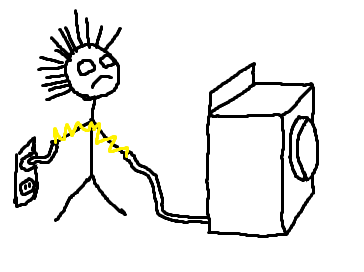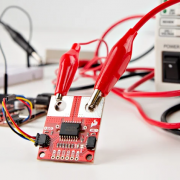The Science of Licking a 9V Battery
Why do we feel a tingle when we lick a 9V battery?
ReplaceMeOpen
ReplaceMeClose
Electricity Basics
If you're familiar with Ohm's Law, you know that voltage is a function of current and resistance (namely, V = IR). The important thing to remember is that everything is a conductor and can be modeled as a resistor. Things like wire and metal are obvious conductors and have a low resistance. Your body is also a conductor - just a poor one.
While it is impossible to know the exact resistance between two points on your body (blood, bone, muscle tissue, and skin all have different resistances), we can generally assume that dry skin has a resistance of 100kΩ. This will change based on perspiration, hair, etc. For the sake of an example, let's take a 9V battery and touch both terminals to our skin. What happens? Not a lot. With some Ohm's law ~~magic~~ math, we can calculate the approximate current flowing between the terminals:
Now, take that same 9V and lick the terminals. Seriously. It's safe (mostly). This time, assuming the 9V has some charge, you should have felt a rather unappetizing tingle course through your tongue. Why did you feel it this time? Well, saliva is much better conductor than skin. We can approximate the resistance of a wet (with saliva) human tongue at about 7kΩ. More math gives us:
That's about 1.3mA of current flowing between the battery's terminals, which is a good deal more than the current flowing during the dry skin test (0.09mA).
Your Body's Response
As it turns out, your body has a pretty strong reaction to electric current. Even tiny amounts of current can be felt and be potentially dangerous.
| 1 - 5 mA | Tingling sensation |
| 5 - 10 mA | Pain |
| 10 - 20 mA | Involuntary muscle contractions |
| 20 - 100 mA | Paralysis, heart stoppage |
Anything less than about 1mA is imperceptible. When we held the 9V to our tongue, about 1-2mA was flowing between the terminals. Because the tongue consists of a thin membrane with nerve endings near the surface, we could readily feel the current as it excited the nerves. Anything higher than 9V could be potentially dangerous to our poor tongue.
While it might be safe to handle 9V batteries with our bare hands (that 100kΩ offers a good deal of protection from that small voltage), ~1mA directly through the heart is enough to cause ventricular fibrillation (the heart stops beating in a coordinated manner and cannot pump blood to the rest of the body). This requires electrodes being punctured into the body near the heart. In this case, even something like 9V can be lethal (remember: your internals have a LOT less resistance than your skin, some estimations as low as 300 Ω).
Safety ~~Third~~ First
Electricity is still dangerous. Here are some points to keep in mind if you work with higher voltages:
- Above about 10mA, you lose control of your muscles, which means that you will likely be unable to let go of the thing that's shocking you.
- Work with at least one other person present and use rubber-coated equipment. More safety guidelines can be found here.
- AC and DC have slightly different effects on the body, but both can be equally dangerous. To determine which is more painful, check out this video.













